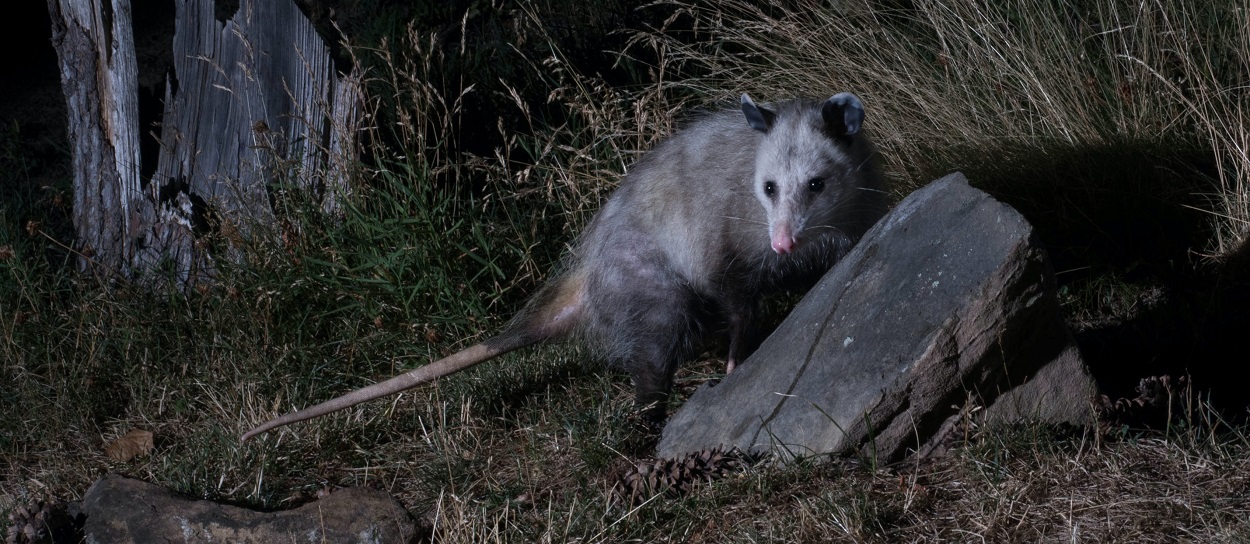
Opossum Removal
For Immediate Help
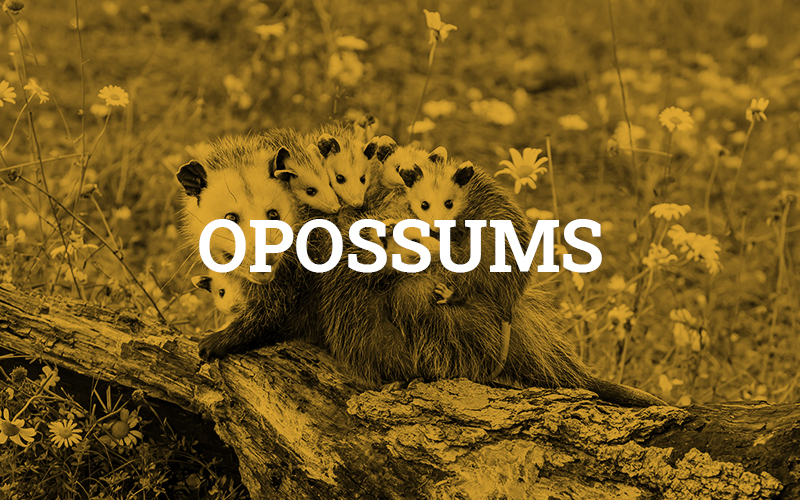
The opossum population is on the rise. Sightings of these critters have increased in Toronto recently. The Virginia opossum is the only marsupial native to North America, but they are more vulnerable to cold weather compared to other nuisance animals.
As opportunistic omnivores, opossums will eat almost anything. They are as satisfied with their usual diet of insects, berries, and fruit as they are with our trash, outdoor pet food, and roadkill. Attics, porches, crawlspaces, and sheds are attractive places for their dens because they are so close to the consistent source of trash we create.
Opossum Control Services
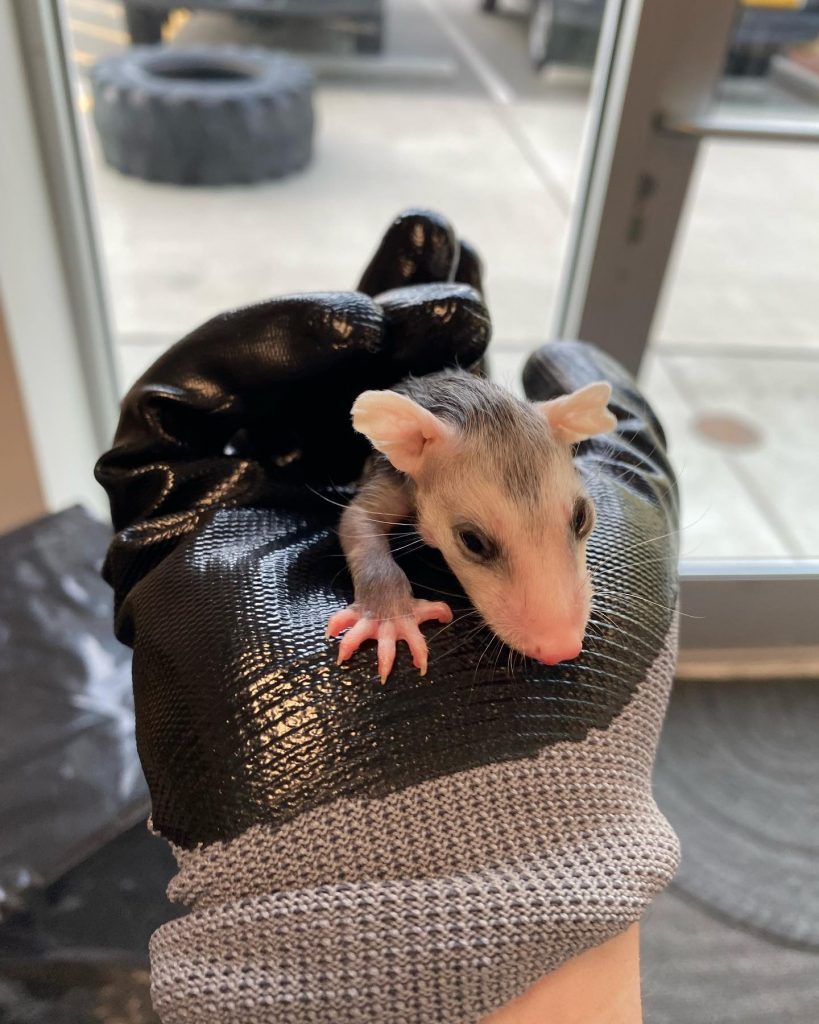
Opossums are docile creaturess that do not attack. The biggest concerns with an infestation are property damage and health risks. Opossums are known to carry neurological and respiratory diseases like tuberculosis and spotted fever. They will damage insulation, electrical wires, and plumbing or tear up your yard and garden looking for food.
Inspection
Signs of raccoon damage vary, but our inspections look for signs of digging, gnawing, and the hand-shaped marks left behind by these animals. Wildlife removal without a thorough inspection could result in some animals being left in the home.
Opossum Trapping and Removal
Though they are not prone to aggression, opossums are still wild animals. As such, any attempts at opossum trapping should be done by a trained professional. Critter Control specialists are educated in opossum behavior and can effectively and safely trap an opossum. Untrained individuals do not have the knowledge, resources, and certifications to safely and properly handle the marsupials as professionals do.
Exclusion and Control
Opossum control is the process of habitat modification that makes a yard and home less attractive to opossums.
These activities include sealing gaps to limit an opossum’s ability to get into walls, trimming branches that overhang the house so opossums can’t access the roof, and tightly sealing trash cans.
Signs of Opossum Problem
Opossums, like many of the creatures we encounter, are nocturnal. Unless you see an opossum, it may be difficult to discern whether the critters in your attic or yard are opossums, raccoons, squirrels, or rodents. But, you know something’s causing damage or keeping you awake at night with its scampering and vocalizations. Other signs of an opossum infestation include a musky smell, tracks, and feces.
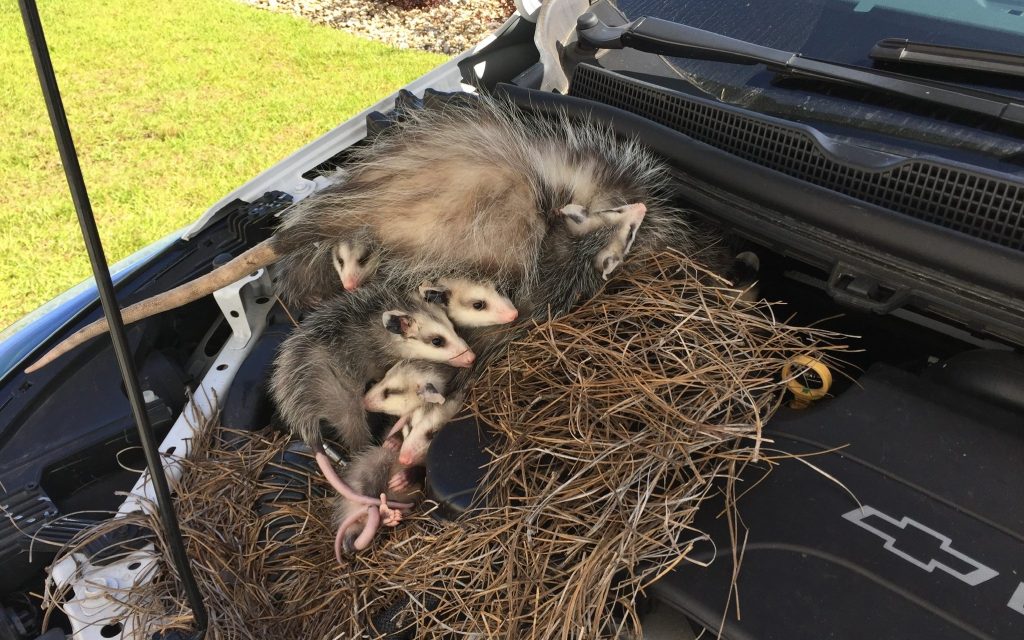
Opossum Sounds & Noises
Opossums are usually silent. If you hear one, it will be at night.
Vocal Noises
These pests will make clicking noises when they’re trying to attract mates and hissing or growling sounds when they feel threatened. An opossum joey will make noises that sound like sneezing.
Clicking and “choo choo” sounds coming from roofs and attics often mean that mothers and their babies have made their dens there.
Hisses and clicks in basements, garages, or under porches could be mating calls or attempts to frighten off predators like coyotes, foxes, or large dog
Movement Noise
Opossums are quiet critters. The sound of an animal rustling or scurrying about the attic or in the chimney is a common sign that a raccoon has moved in. Typical opossum sounds also occur when the pests walk across rooftops, construct their dens, or attempt to gain entry through holes or other small openings that lead to attractive denning sites. People tend to hear opossum sounds most frequently at night due to the nocturnal behavior of the pests.
Musky Smell
Opossums secrete a musky smell to mark their territory.
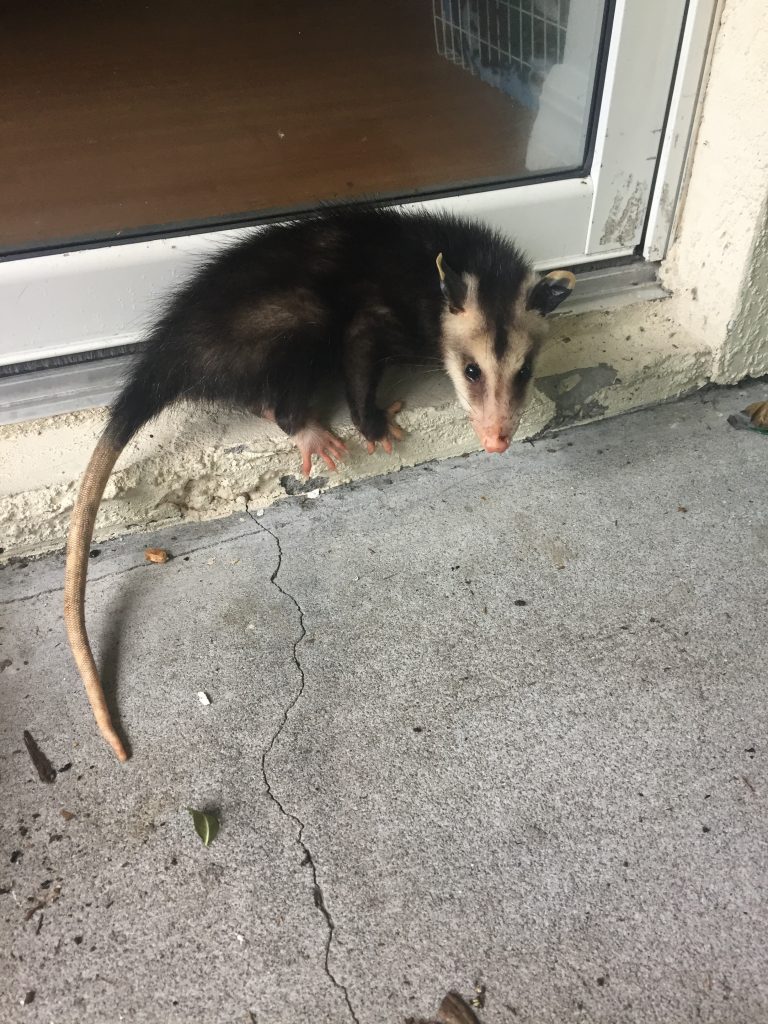
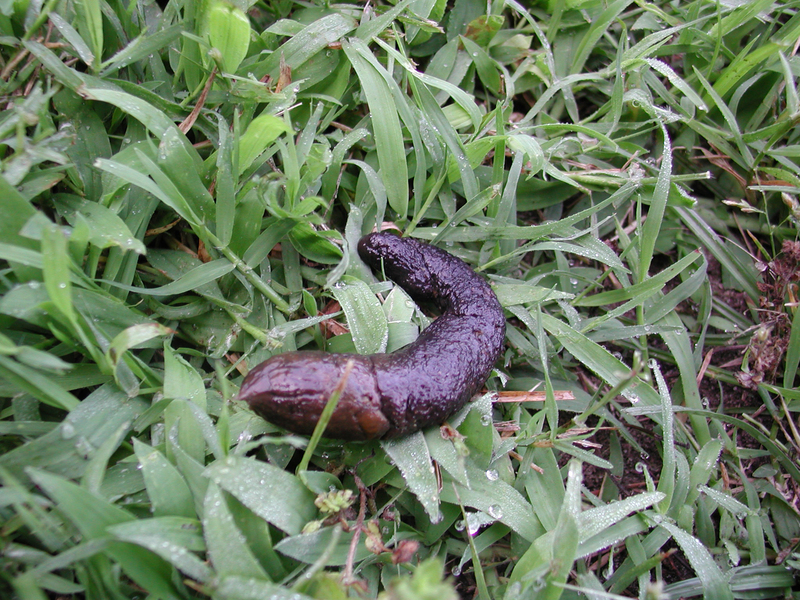
Opossum Feces & Tracks
Similar in size to cat droppings, opossum droppings contain visible bits of their diverse diet.In the yard, their odd-looking dung is often found atop patios and along walkways. However, enjoy the lawn with caution, as opossum waste is sometimes hidden within gardens or other brushy areas.
Opossum tracks look similar to human handprints because they have five toes on each foot.
Risk Associated with Opossum Infestation
Even though opossums have an unappealing, rat-like appearance, they do not attack humans. To avoid confrontation, opossums play dead so predators leave them alone.
The danger they pose is that they carry diseases such as tuberculosis, spotted fever, and other neurological and respiratory illnesses. Opossums eat and carry ticks. Other parasites they carry include mites and lice.
Opossums harm property. If within a home or shed, they will gnaw wood and electrical wires, causing instability and the risk of fire. In the yard, they will help themselves to fruit and vegetables. They will also eat unsecured pet food left outside overnight and rummage through garbage cans or compost heaps to find bits and scraps to eat. Opossums have also been known to enter chicken coops and destroy birds, nests, and eggs.
Opossum Damage
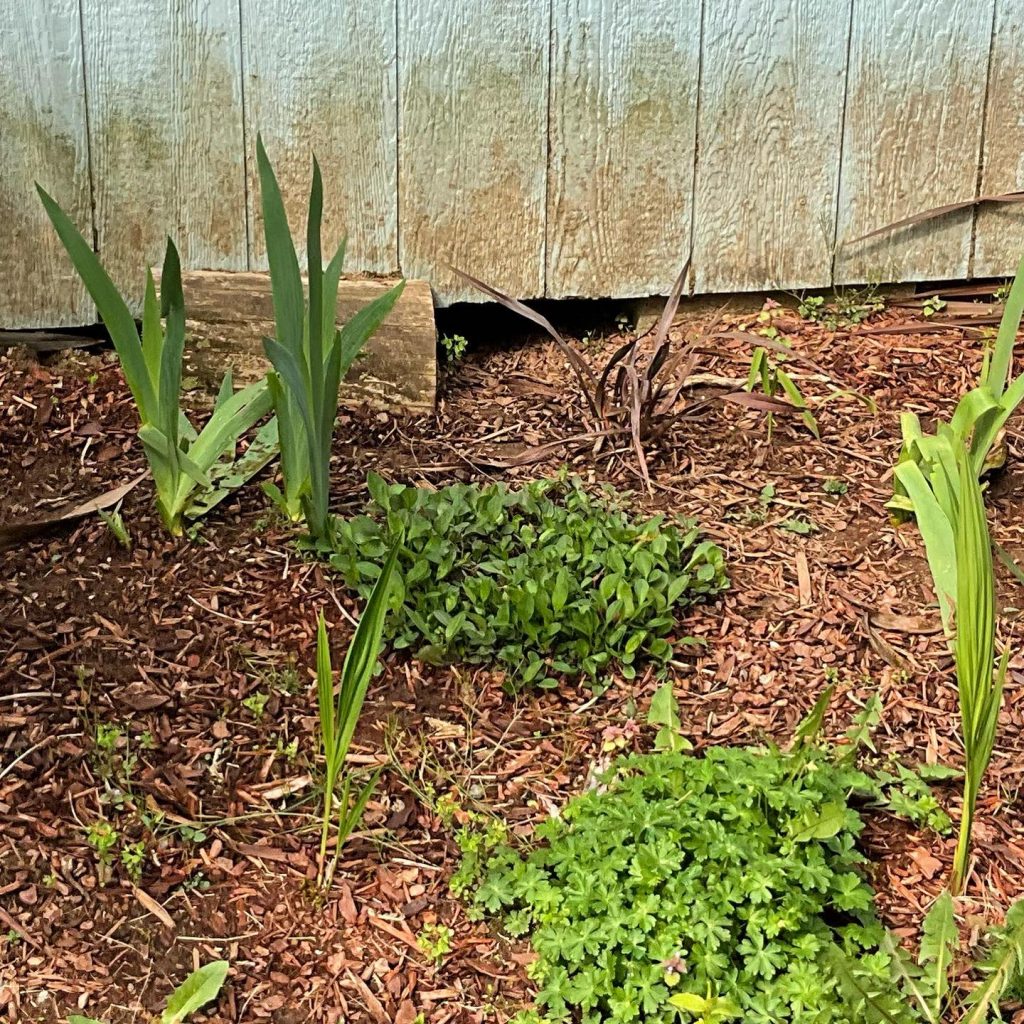
Mostly considered minor nuisances, opossums become problematic when they decide to nest and forage near residential and commercial areas. Under sheds, decks, and porches, the critters build nests where they take shelter and raise their young. They prefer these enclosed spaces because they’re safe from predators and harsh weather. Once these burrows are established, it can be hard to eliminate an opossum.
Opossums can also cause problems while looking for food. They are omnivores, and an opossum diet includes insects, small rodents, frogs, birds, and berries. Opossums can dig up your lawn looking for grubs, slugs, and insects. They steal eggs from chicken coops. They make a mess rummaging in garbage cans or eating pet food.
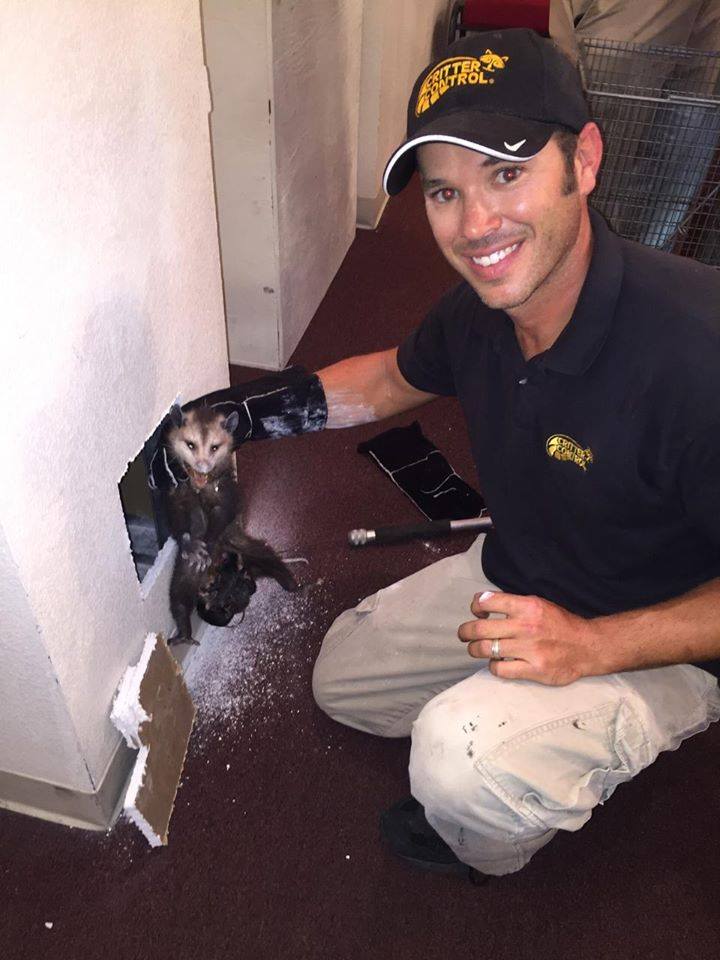
Opossum Diseases
Opossums become dangerous with their ability to transmit diseases to pets and people. Known to carry leptospirosis, tuberculosis, coccidiosis, spotted fever, tularemia, and other diseases, pesky creatures pose serious health threats when they invade urban environments.
Opossums are rarely known to contract rabies because their body temperature is too low for the rabies virus. They are even less likely to pass it on to other organisms they come into contact with.
Furthermore, opossums serve as host animals to fleas, ticks, lice, and mites, which puts dogs and cats at risk of becoming infested with these parasites. Owners of horses should be aware of the dangers associated with opossums that carry a protozoan known as Sarcocystis neurona, which can lead to neurologic disease in the equines.
What Our Clients Say About Us
Frequently Asked Questions
Are opossums dangerous?
Generally, no opossums are not dangerous. But they do have sharp teeth and claws so do not pick them up. Opossums can carry diseases that transmit to people.
Who removes raccoons for free?
Most cities will not remove a raccoon from your home.
Do opossum repllents work?
At best, repellents offer a temporary solution. Opossum can grow accustomed to some repellents and deterrents. If you do not seal entry points, opossum can reenter your home.
How long do opossums live?
Opossums have a relatively short life span in contrast to other mammals of their size. They usually live only one to two years in the wild. Mother opossums give birth to litters of tiny opossum babies the size of honeybees, known as joeys, which crawl inside the mother’s pouch and continue to grow. Once the joeys become too large for the pouch, they ride upon the mother’s back while she scavenges for food.
Do opossums hibernate during the winter?
Opossums do not hibernate during the winter. They have to constantly forage for food. They will seek warm shelter because their ears, nose, and tail can get frostbite.
What’s the best way to get rid of opossums?
Professional exclusion services provide the most effective long-term solution for opossum control.
How can I keep opossums away?
You can keep opossums away with some simple habitat modifications. It makes your yard and house less attractive to opossums. Simple opossum control methods include securing garbage cans, regular yard maintenance, and keeping pet food inside.
These activities include sealing gaps to limit an opossum’s ability to get into walls, trimming branches that overhang the house so opossums can’t access the roof, and tightly sealing trash cans.
